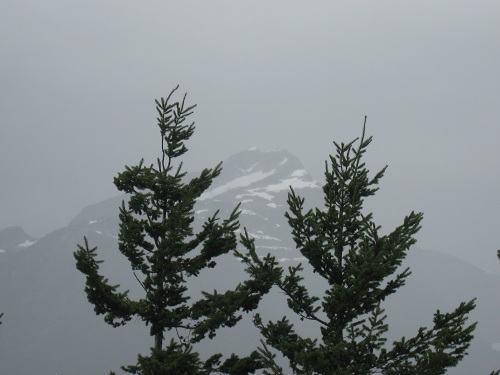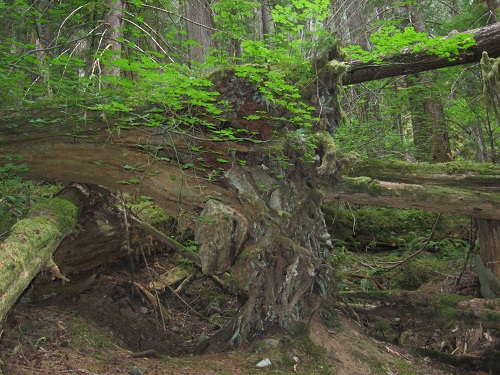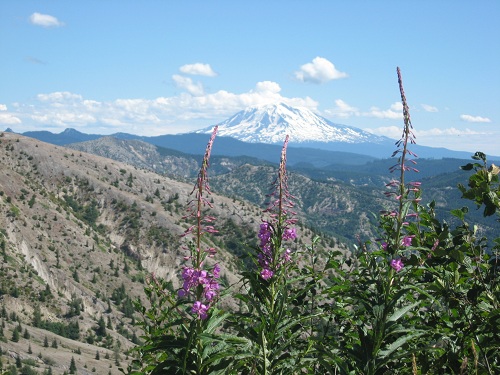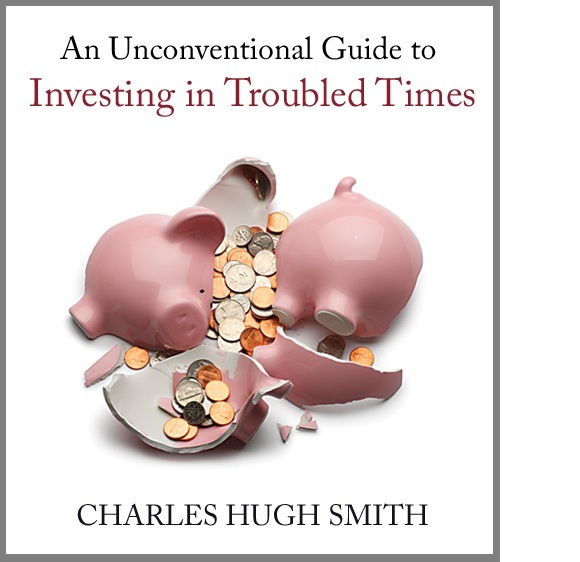Don't Let the Dessert Cart on the Titanic Pass You By
The National Parks are like the dessert cart on the Titanic--don't pass up the chance to visit them. Like Captain Smith said on the bridge of the Titanic when he realized the iceberg had ripped open a fatal number of watertight compartments: This sucker's going down. OK, so Captain Smith didn't use that phrase, he probably uttered something more colorfully maritime. But the point is we all know the global economy, and the U.S. economy with it, is going down, as the supposedly "unsinkable" compartments of credit-based consumption and rampant central-bank/Central State-backed speculation are flooding and the central bank's pumps are failing. Since this financial ship is going down, then don't pass on the dessert cart, which to my mind is the National Park system. We all know vacations are discretionary spending, and so they are one of the first things axed when money gets tight: Just 33% Took A Summer Vacation This Year. Of those who took vacations these past two summers, 51% say current economic conditions forced them to cut back on spending, showing little change from last year. Nearly as many (47%) say the current economy did not force them to cut back on their summer vacation. If you go car-camping in a small, high-mileage vehicle, the dessert cart is remarkably low-calorie. We spent a grand total of $225 on gasoline to drive 2,415 miles (40 miles per gallon in a 1998 Honda Civic with 15-year old technology) over nine days, and less than $160 for campground fees, which ran from $12 in some Forest Service campgrounds to $20 for contractor- operated FS campgrounds, and $22 for Washington state parks. The National Park campground in the Northern Cascades Park was $15 a night. (It's generally free to camp on Bureau of Land Management (BLM) land. Do some web searches to discover the full range of camping options.) Given that a very basic motel room now costs around $50 or $60 for two people, and a "nicer one" can easily cost $100 or more, then camping is clearly an affordable option for most households. An annual multi-agency pass to the National Parks and other Federally owned/managed sites is $80. As for food, you really don't have to limit yourself to hot-dogs and canned chili; here are a few of the meals we prepared with our one-burner Coleman stove: Breakfast: French toast with fresh mango, honey/agave syrup and coffee. Frittata made with our own garden-grown zucchini. Yet another one-burner gourmet dinner: New York steak dipped in sambar (zesty Indian soup) and rolled into a tortilla wrap, with stir-fried garden-grown zucchini and onions/garlic. Here's a typical Forest Service campground near Mount Rainier: camping helps re-set the context of one's place in the world. One of several falls on the McCloud River in Northern California: A view of the Northern Cascades National Park in Washington state, on a blustery day: A less-than-benign forest-spirit tree on an old-growth trail in the Northern Cascades: Another view of old-growth, 2 miles into the forest. After walking about a kilometer (.62 miles), the crowds disappear and after a mile or two, you have any trail to yourself. Mount Rainier on a gloriously sunny day, from the Paradise entry: The northern side of Rainier (Sunrise): Mount St. Helens, 31 years after the monumental earthquake and volcanic eruption. The "forgotten" peak of the Cascades, Mt. Adams, seen from Mount St. Helens. Forest Service campgrounds dot the vicinity of Mt. Adams. Please forgive the deeply political nature of our car's bumper stickers: The National Parks are like the dessert cart on the Titanic--don't pass up the chance to visit them. Our entire 9-day vacation cost less than one night in a vapid, artificial, "luxury" resort. Yes, it takes time and effort, but good golly, let's enjoy the desserts before the cart rolls away. Podcast/Interview alerts: My friend Richard Metzger of the highly popular Dangerous Minds site invited me down to his studio in L.A. for a high-definition (and hopefully illuminating) discussion on THE END OF WORK: AN INTERVIEW WITH CHARLES HUGH SMITH (video). Thanks, Richard! As always, it was great fun and I learned a lot. Zack Miller of tradestreaming.com was kind enough to interview me recently: check it out if you're interested in investing in troubled times, like now, f'rinstance: Investing In Troubled Times – With Charles Hugh Smith. Thank you, Zack, for the chance to ramble on about my favorite topics. If this recession strikes you as different from previous downturns, you might be interested in my new book An Unconventional Guide to Investing in Troubled Times, now available in Kindle ebook format. You can read the ebook on any computer, smart phone, iPad, etc.Click here for links to Kindle apps and Chapter One. The solution in one word: Localism. Order Survival+: Structuring Prosperity for Yourself and the Nation (free bits) (Mobi ebook) (Kindle) or Survival+ The Primer (Kindle) or Weblogs & New Media: Marketing in Crisis (free bits) (Kindle) or from your local bookseller. Of Two Minds Kindle edition: Of Two Minds blog-Kindle













Readers forum: DailyJava.net.
My new book An Unconventional Guide to Investing in Troubled Times is available in Kindle ebook format. You can read the ebook now on any computer, smart phone, iPad, etc. Click here for more info about Kindle apps and the book.Thank you, Claire B. ($50), for your wondrously generous contribution (from Malaysia) to this site -- I am greatly honored by your support and readership. Thank you, Dana F. ($10/mo), for your outrageously generous subscription to this site -- I am greatly honored by your support and readership.























